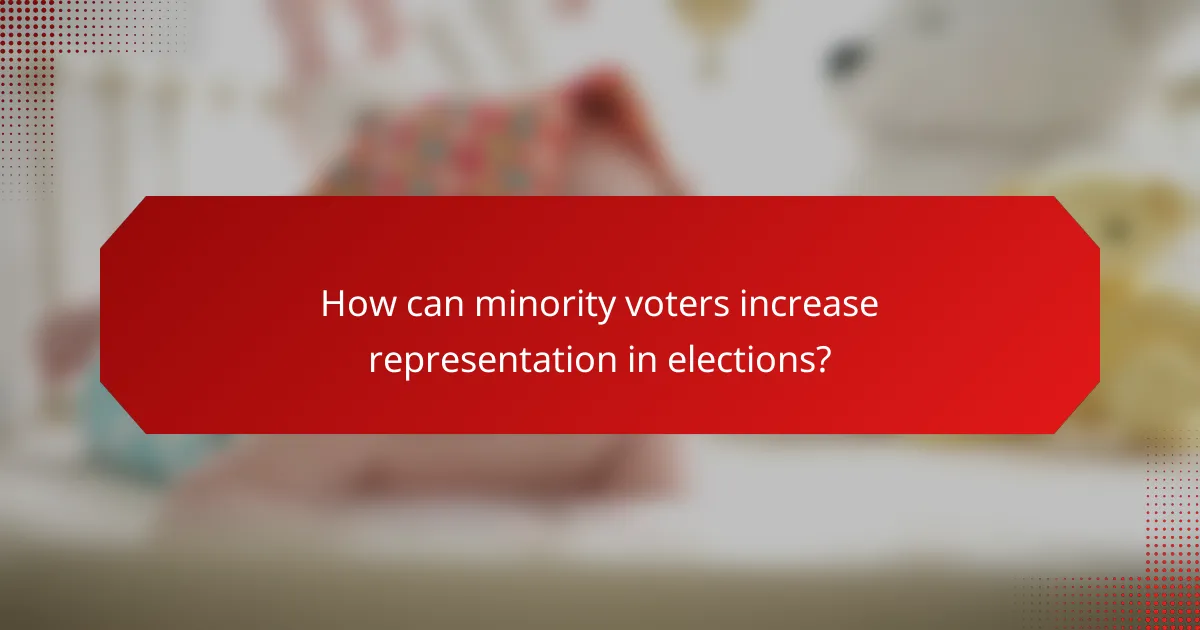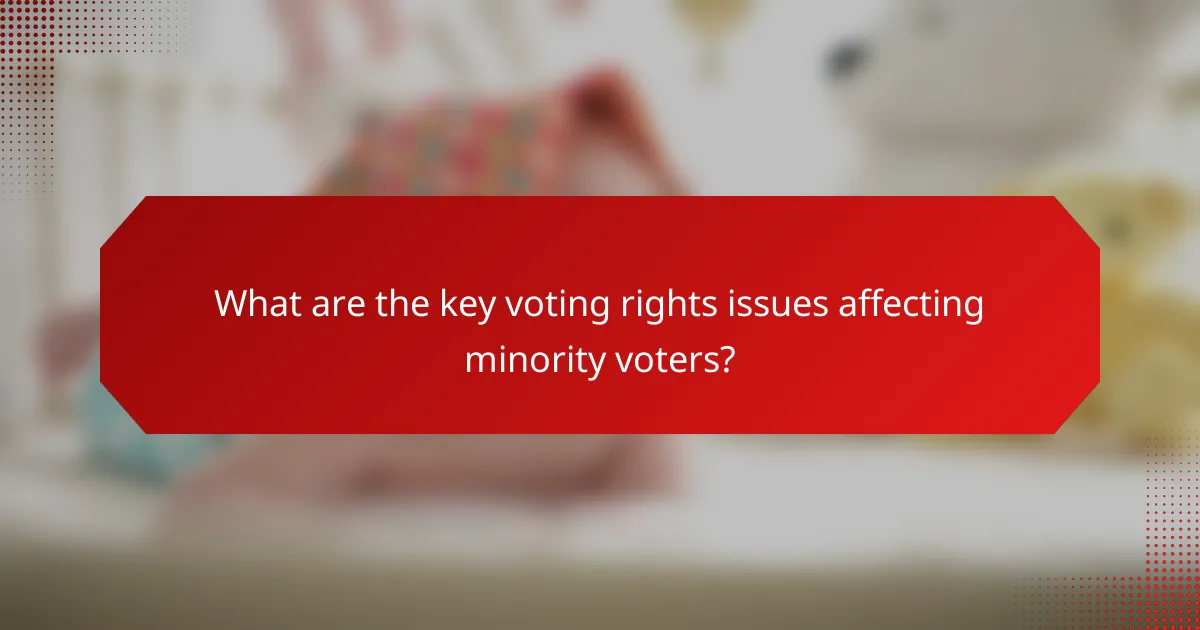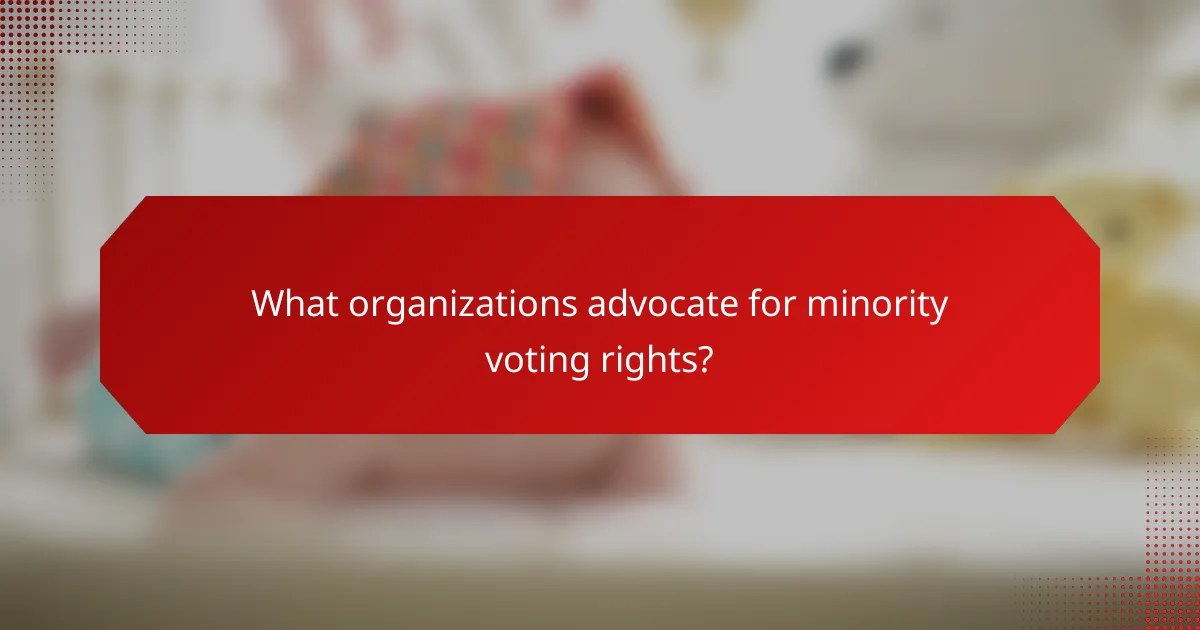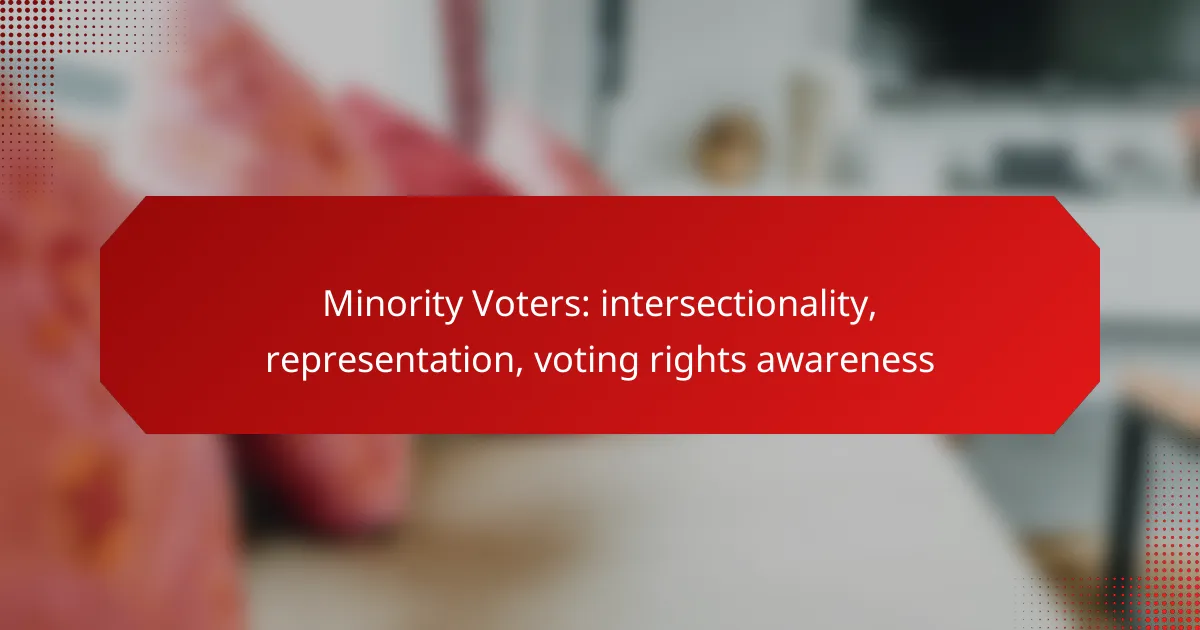Minority voters play a crucial role in shaping electoral outcomes and enhancing representation by engaging in the electoral process and advocating for their rights. However, they often encounter significant challenges, including restrictive voting laws and systemic barriers that hinder their participation. Understanding the concept of intersectionality is essential, as it reveals how overlapping identities can create unique obstacles for these voters, impacting their access to information and overall engagement in the democratic process.

How can minority voters increase representation in elections?
Minority voters can increase representation in elections by actively participating in the electoral process, advocating for their rights, and collaborating with others to amplify their voices. Engaging in community initiatives and building coalitions are essential steps toward ensuring that their interests are represented in political decision-making.
Community organizing initiatives
Community organizing initiatives empower minority voters by fostering local engagement and mobilizing resources. These initiatives often involve grassroots campaigns that educate voters about their rights and the electoral process, helping to increase turnout during elections.
Examples of successful initiatives include neighborhood meetings, voter registration drives, and partnerships with local organizations. By creating a strong community network, minority voters can effectively advocate for their needs and influence local policies.
Coalition-building strategies
Coalition-building strategies involve forming alliances with other groups to strengthen the collective voice of minority voters. By collaborating with organizations that share similar goals, minority communities can pool resources and amplify their impact on elections.
Effective coalitions often include a diverse range of stakeholders, such as civil rights groups, labor unions, and faith-based organizations. This diversity can enhance advocacy efforts and broaden the reach of voter engagement campaigns.
Engagement with local leaders
Engaging with local leaders is crucial for minority voters to ensure their concerns are heard and addressed. Building relationships with elected officials and community leaders can lead to increased representation and support for policies that benefit minority populations.
Regular meetings, town halls, and public forums provide opportunities for minority voters to voice their issues and hold leaders accountable. Active participation in these events can help establish a dialogue that promotes understanding and collaboration.
Utilizing social media platforms
Social media platforms are powerful tools for minority voters to raise awareness and mobilize support. These platforms allow for the rapid dissemination of information, enabling voters to share their experiences and rally others around important issues.
Effective use of social media includes creating engaging content, using targeted hashtags, and collaborating with influencers who can amplify messages. By leveraging these platforms, minority voters can reach a wider audience and encourage greater participation in elections.
Voter education programs
Voter education programs are essential for informing minority voters about their rights and the voting process. These programs can cover topics such as registration requirements, polling locations, and the importance of voting in local elections.
Implementing workshops, informational sessions, and distributing educational materials can significantly enhance voter awareness. Tailoring these programs to address specific community needs ensures that minority voters are well-equipped to participate in elections effectively.

What are the key voting rights issues affecting minority voters?
Minority voters face several critical voting rights issues that hinder their participation in elections. These challenges include restrictive voter ID laws, gerrymandering practices, limited access to polling places, and various voter suppression tactics.
Voter ID laws
Voter ID laws require individuals to present specific forms of identification before casting their ballots. These laws can disproportionately affect minority voters who may lack the required IDs due to socioeconomic barriers.
For example, some states only accept government-issued IDs, which can be difficult for low-income individuals to obtain. Advocacy groups often recommend checking state requirements ahead of time to ensure compliance and prevent disenfranchisement.
Gerrymandering practices
Gerrymandering involves manipulating electoral district boundaries to favor one party over another, often diluting the voting power of minority communities. This practice can lead to underrepresentation in legislative bodies.
Minority voters may find their votes carry less weight if districts are drawn to minimize their electoral influence. Engaging in local advocacy for fair redistricting processes can help combat these practices.
Access to polling places
Access to polling places is crucial for ensuring that all voters can participate in elections. Minority communities often face fewer polling locations, leading to long wait times and increased difficulty in casting votes.
To improve access, voters should familiarize themselves with polling locations and consider early voting options when available. Community organizations can also play a role in mobilizing resources to assist those with transportation challenges.
Voter suppression tactics
Voter suppression tactics include a range of strategies aimed at discouraging or preventing specific groups from voting. These can include aggressive purging of voter rolls, misinformation campaigns, and intimidation at polling sites.
Being informed about one’s voting rights is essential. Voters should report any suspicious activities or barriers they encounter to local election protection hotlines to ensure their rights are upheld.

How does intersectionality impact minority voter experiences?
Intersectionality significantly affects minority voter experiences by highlighting how overlapping identities, such as race, gender, and socioeconomic status, create unique challenges in the voting process. These compounded factors can lead to disparities in representation, access to information, and overall voter engagement.
Impact of race and gender
The intersection of race and gender plays a crucial role in shaping minority voter experiences. For instance, women of color often face both racial and gender biases that can discourage their participation in elections. This dual burden can manifest in fewer resources for campaigning and outreach, leading to lower voter turnout among these groups.
Additionally, the representation of women of color in political office remains disproportionately low, which can further alienate these voters. When candidates do not reflect the diversity of the electorate, it can diminish trust and engagement in the political process.
Economic disparities
Economic disparities significantly influence minority voter experiences by affecting access to resources necessary for voting. Low-income individuals may struggle with transportation costs, time off work, or even the ability to pay for identification, which can vary by state. These barriers can lead to lower participation rates among economically disadvantaged groups.
Moreover, economic inequality often correlates with educational disparities, which can limit awareness of voting rights and the importance of participation. Efforts to provide resources and education about voting can help bridge this gap and empower minority voters.
Language barriers
Language barriers can hinder minority voters from fully participating in the electoral process. Non-English speakers may struggle to understand ballots, voter registration materials, and candidate information, which can lead to confusion and disenfranchisement. Providing multilingual resources is essential for ensuring that all voters can make informed decisions.
In areas with significant populations of non-English speakers, local governments should prioritize language access initiatives, such as offering translation services at polling places and distributing materials in multiple languages. This can enhance voter engagement and inclusivity.
Social justice movements
Social justice movements have been pivotal in advocating for minority voter rights and raising awareness of the unique challenges these groups face. Movements such as Black Lives Matter and others have mobilized communities to address systemic inequalities and promote voter registration efforts. These initiatives often focus on educating voters about their rights and the importance of participation in elections.
Moreover, social justice organizations frequently collaborate with local governments and advocacy groups to create campaigns that target underrepresented communities. By leveraging grassroots efforts, these movements can significantly increase voter turnout and ensure that minority voices are heard in the political arena.

What organizations advocate for minority voting rights?
Several organizations play a crucial role in advocating for minority voting rights, focusing on representation, awareness, and legal support. These groups work to ensure that all citizens, especially those from marginalized communities, have equal access to the voting process and can exercise their rights effectively.
NAACP
The National Association for the Advancement of Colored People (NAACP) is one of the oldest civil rights organizations in the United States. It actively campaigns for voting rights through legal challenges, public education, and grassroots mobilization, aiming to eliminate barriers that disproportionately affect minority voters.
NAACP initiatives include voter registration drives and advocacy for legislation that protects voting rights. They also provide resources to help individuals understand their voting rights and how to navigate the electoral process.
League of Women Voters
The League of Women Voters is a nonpartisan organization that encourages informed and active participation in government and influences public policy through education and advocacy. They focus on empowering voters by providing unbiased information about candidates and issues.
Through initiatives like voter registration drives and educational forums, the League works to increase voter turnout among minority communities. Their resources help voters understand the voting process, including deadlines and requirements specific to their state.
ACLU
The American Civil Liberties Union (ACLU) defends individual rights and liberties, including the right to vote. They engage in litigation to challenge laws and practices that disenfranchise minority voters, ensuring compliance with federal and state voting rights laws.
ACLU’s efforts include monitoring elections, providing legal assistance to voters facing discrimination, and advocating for reforms that enhance voting access. Their work is crucial in addressing systemic issues that affect minority voting rights.
Southern Poverty Law Center
The Southern Poverty Law Center (SPLC) is dedicated to fighting hate and bigotry while seeking justice for the most vulnerable members of society. Their work includes monitoring and combating voter suppression tactics that disproportionately impact minority groups.
SPLC conducts research and advocacy to raise awareness about voting rights issues and provides legal support to those facing discrimination at the polls. Their initiatives aim to protect the voting rights of all citizens, particularly those from marginalized communities.
